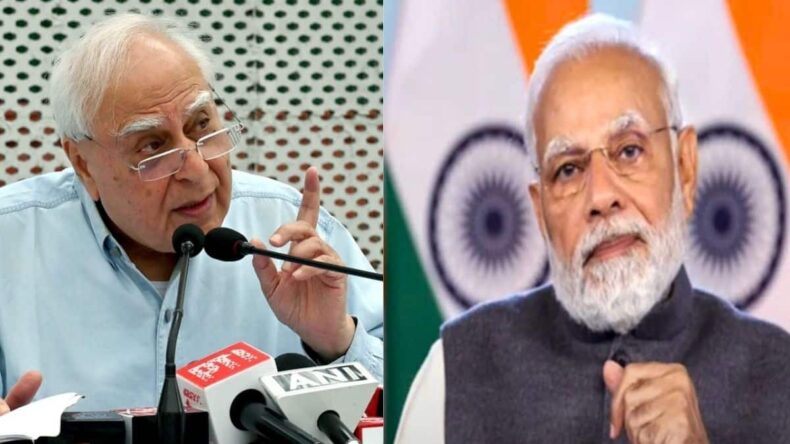Communal violence has been on the rise in India, and it has recently spilled over into West Bengal and Bihar. The violence has been condemned by many, including Rajya Sabha MP Kapil Sibal, who has spoken out against it and questioned the silence of Prime Minister Narendra Modi.
Sibal’s statement comes at a time when both West Bengal and Bihar are experiencing communal violence. In West Bengal, the violence erupted after the assembly election results were announced in May 2021, with clashes between supporters of the ruling Trinamool Congress (TMC) and the Bharatiya Janata Party (BJP).
In Bihar, the violence started in February 2021 after a mob attacked a mosque in the Bhagalpur district. The incident sparked communal tension in the region, which later turned violent.

Communal Violence Claims Lives and Property in West Bengal and Bihar; Sibal Urges PM to Break Silence on the Issue
The violence in both states has claimed the lives of many, and has left several injured. It has also caused extensive damage to property and businesses, and has forced many people to flee their homes.
In his remarks, Sibal urged the populace to cease “burning Bengal and Bihar, and to the roots of hatred,” which, he claimed, only served the interests of politicians and their ideologies.
He declared, “The common man becomes a casualty of this animosity.
Sibal questioned Prime Minister Narendra Modi’s “silence” on the issue and urged that the violence not be blamed on the next general elections in 2024.
It is not the first time that Sibal has criticized the Modi government. He has been a vocal critic of the government’s policies and has accused it of not doing enough to address the concerns of the people.
Sibal’s comments have been echoed by other opposition leaders, who have also condemned the communal violence in West Bengal and Bihar.
Congress leader Rahul Gandhi, in a recent tweet, said that the violence in West Bengal was “unacceptable” and that “peaceful protests are a democratic right”.

Communist Party of India (Marxist) leader Sitaram Yechury also condemned the violence in West Bengal, and accused the BJP of inciting it.
He claimed that the BJP was stirring up unrest in West Bengal for political reasons.
The BJP, however, has denied the allegations, and has accused the TMC of instigating the violence.
According to BJP spokesperson Sambit Patra, “The TMC is encouraging the unrest in West Bengal and it is doing so as to deflect attention away from its own failures.”
The violence in West Bengal and Bihar has once again brought to the fore the issue of communalism in India. Communalism is defined as the belief that people belonging to a particular religious or ethnic group should have exclusive political and economic rights.
Communalism has been a major issue in India since its independence in 1947, and has been responsible for several violent incidents in the country.
The government has taken several steps to address the issue of communalism, including the enactment of laws to prevent hate speech and the formation of special police units to deal with communal violence.

However, many critics feel that these measures are not enough, and that the government needs to do more to promote communal harmony in the country.
The issue of communalism is likely to remain a major challenge for India in the years to come. As the country continues to grapple with issues of poverty, inequality, and corruption, it will be important for the government to promote unity and tolerance among all communities.
The communal violence in West Bengal and Bihar has once again highlighted the need for India to address the issue of communalism. It is important for the government and all political parties to work towards promoting communal harmony and to ensure that incidents of violence are not allowed to occur in the future. Only then can India truly progress and become a prosperous nation that is united in its diversity.
The issue of communalism is not limited to India alone, as it is a global phenomenon that has led to conflicts and violence in several parts of the world. Therefore, it is important for the international community to work together to promote peace and tolerance among all communities.
In recent years, there have been several initiatives to promote interfaith dialogue and understanding, which have shown promising results in promoting communal harmony. It is important for these initiatives to continue and for more efforts to be made to bring people of different faiths and backgrounds together.

Moreover, it is important for people to understand the dangers of communalism and to reject any attempts by politicians or extremist groups to divide communities along religious or ethnic lines.
The media also has a crucial role to play in promoting communal harmony, by reporting objectively on incidents of violence and by highlighting the positive contributions of different communities to the society.
The issue of communalism in India is a complex and multifaceted one that requires a comprehensive and sustained effort from all stakeholders. While the government has a crucial role to play in promoting communal harmony, it is also important for civil society, religious leaders, and individuals to work towards building a society that is united in its diversity. Only then can India realize its full potential as a prosperous and inclusive nation.












